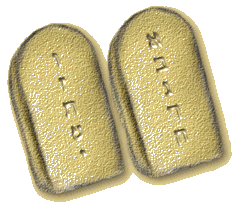
The Ten Words
aserat ha dibrot
|
According to Judeo-Christian tradition, as related in the Bible, the Ten Commandments were revealed by God to Moses and form the fundamental moral component of God's covenant with Isra'el. The Ten Commandments appear in 2 places in the Old Testament -- Exodus 20: 1-17 and Deuteronomy 5:6-21; the phrasing is similar but not identical. The expression "Ten Commandments" does not appear in Hebrew, which instead says simply "the Ten Words." The Decalogue differs from all the other legislation of Moses in that it alone of all the Torah was transmitted under circumstances of the most appalling majesty and solemnity. These Ten Words stand out in the midst of Torath Moishe as the epitome of divine revelation inscribed for God's people by the divine finger itself. And to whom shall we liken this man Moses? Of all the Hebrew Old Testament, this man stands above all the rest as Israel's lawgiver prophet deliverer. Christ himself declared that not one jot nor one tittle should pass from the Law till all be fulfilled. And it was Moses alone, of all the characters of the Old Testament, to whom Christ compared himself. See Deuteronomy 18: 15.
Most Protestant, Anglican, and Orthodox Christians follow Jewish tradition, which considers the introduction ("I am the Lord ...") the first commandment and makes the prohibition against idolatry the second. Roman Catholic and Lutheran tradition follow a division used by Saint Augustine, which combines I and II and splits the last commandment into two that separately prohibit coveting of a neighbour's wife and a neighbour's goods. |
The English phrasing above (of the Mosaic 'Ten Words') is that of the Authorised 'King James' Translation.
